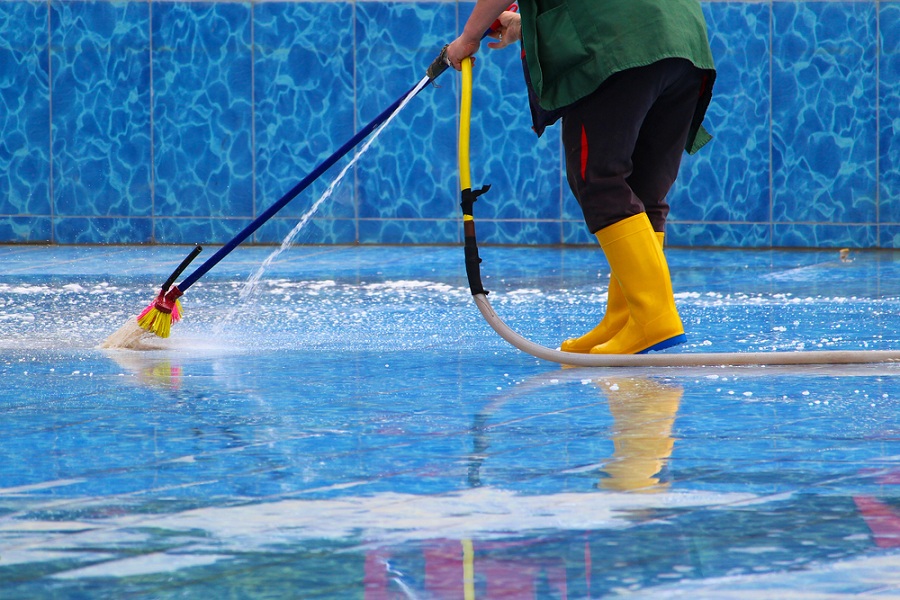A dirty swimming pool can be an eyesore and cause health problems. If you live near a lake, river, or ocean, your pool has been affected by flooding or heavy rain.
When water enters your pool, it leaves debris such as dirt, sand, silt, algae, and bacteria. This debris may contain chemicals that can harm your skin and eyes.
It can also lead to dangerous diseases like Legionnaires’ Disease.
To prevent these problems, follow these steps to clean your pool after a storm or flooding.
Step 1: Remove any floating debris from the pool
Floating debris can include toys, furniture, plants, and other objects. Remove these items from the pool first.
Step 2: Drain the pool
Drain the pool completely. Make sure there are no leaks in the drain system.
Step 3: Wash down the sides of the pool
Wash down the walls of the pool using a hose. Then, use a brush to scrub away algae and dirt.
Step 4: Scrub the bottom of the pool
Scrub the bottom of the swimming pool using a stiff bristle brush. Do not use a sponge or soft bristles.
Step 5: Rinse the pool thoroughly
Rinse the pool thoroughly. Use a garden hose to rinse out the pool.
Step 6: Dry the pool
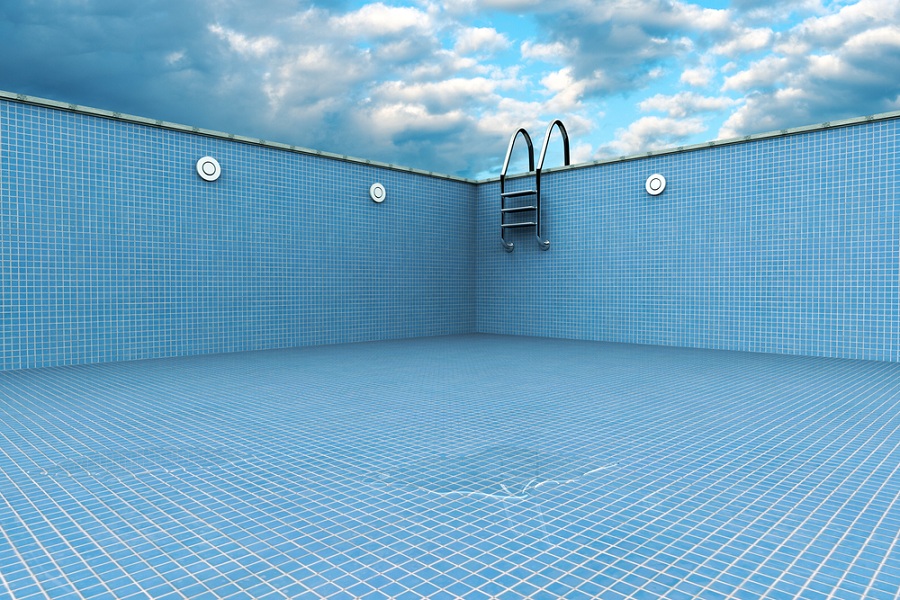
Use a dry towel to dry off the pool. Leave the pool uncovered until it dries completely.
Step 7: Check the filter
Check the filter to ensure that it is working properly. If necessary, replace the filter.
Step 8: Inspect the pump
Inspect the pump to ensure that it is functioning correctly. If necessary, replace it.
Step 9: Test the pH level
Test the pH level of the pool water. The pH level should be between 7.2 and 7.8.
Step 10: Add chlorine
Add chlorine to the pool to kill any remaining germs. Follow the instructions on the label.
Step 11: Re-fill the pool
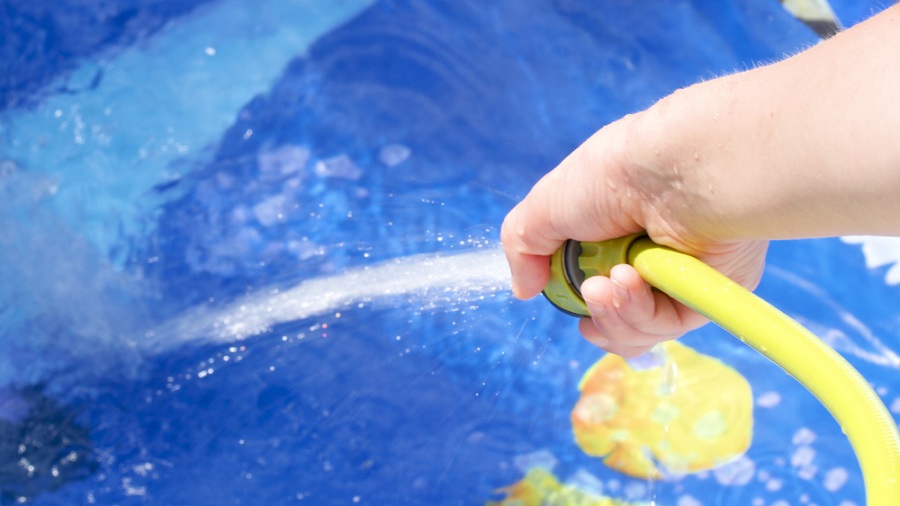
Re-fill the pool with fresh water.
Step 12: Wait 24 hours before entering the pool
Wait 24 hours before reentering the pool.
Why Should You Clean Your Pool After A Flood Or Storm
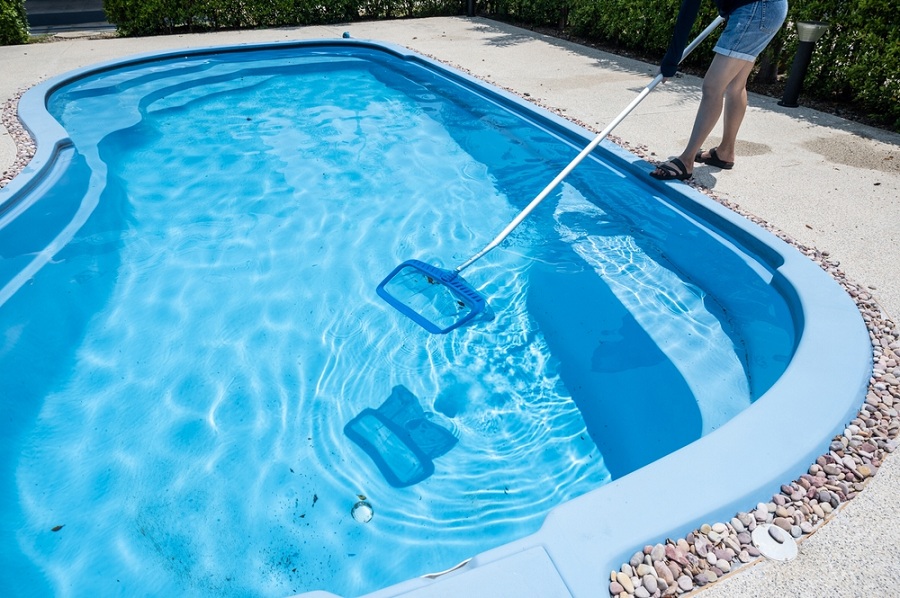
A dirty swimming pool can be unsightly and unhealthy. It can also attract insects and disease-causing organisms.
If you have a swimming pool, clean it at least once every week. Here’s why you need to do this.
Murky Water
Swimming pools become cloudy after a flood or storm because of debris and dirt. These particles block sunlight and keep oxygen from reaching the water’s surface.
This creates murky water that makes swimming difficult for swimmers. Swimming in murky water puts people at risk of drowning.
Bacteria And Germs
Bacteria and viruses can enter your pool through cracks in the concrete. When the water becomes contaminated with bacteria and viruses, they can spread easily throughout the pool.
These germs can infect your skin and eyes. They can even cause serious illnesses, including pneumonia and meningitis.
Clogged Pool Filters
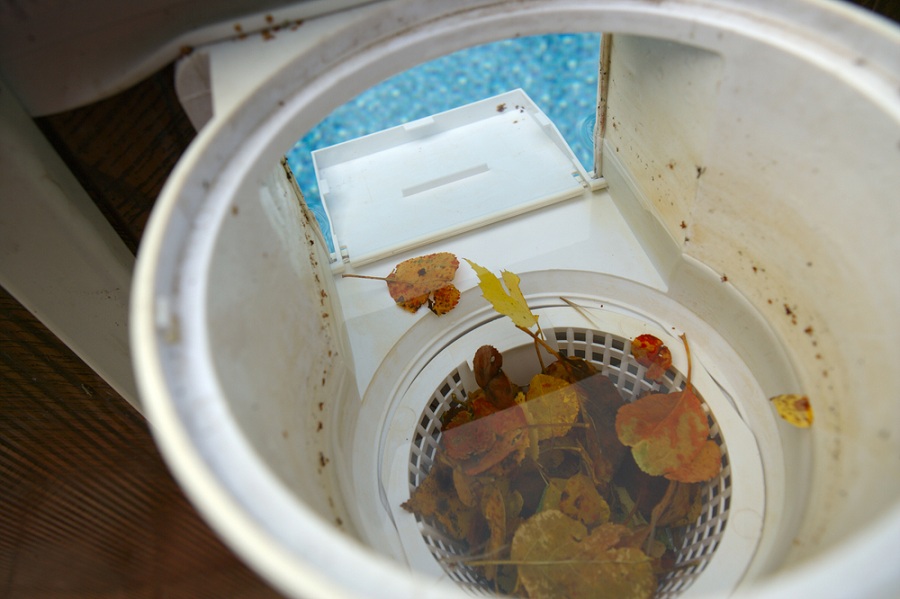
When water flows into your pool, it carries debris and dirt. This debris clogs up your pool filters.
The buildup of debris causes your pool filtration system to work harder. As a result, your pool will require more frequent cleaning.
Water-borne Infections and Illnesses
Flooded swimming pools often contain stagnant water. Stagnant water encourages the growth of harmful microorganisms like E. coli and Giardia.
These germs are dangerous if swallowed by humans. They can cause diarrhea, stomach cramps, vomiting, and other gastrointestinal problems.
Disease-Causing Organisms
Flooded swimming pool water can carry disease-causing organisms like Cryptosporidium, giardia, and Vibrio cholera.
Cryptosporidium is an intestinal parasite that can cause severe diarrhea. People who swim in infected water may develop symptoms such as nausea, abdominal pain, and diarrhea.
Giardia is another parasite that can cause illness. Symptoms include bloating, gas, diarrhea, fatigue, weight loss, and nausea.
Vibrio cholera is a bacterium that can cause severe diarrhea and dehydration.
Ineffective Pool Chemicals
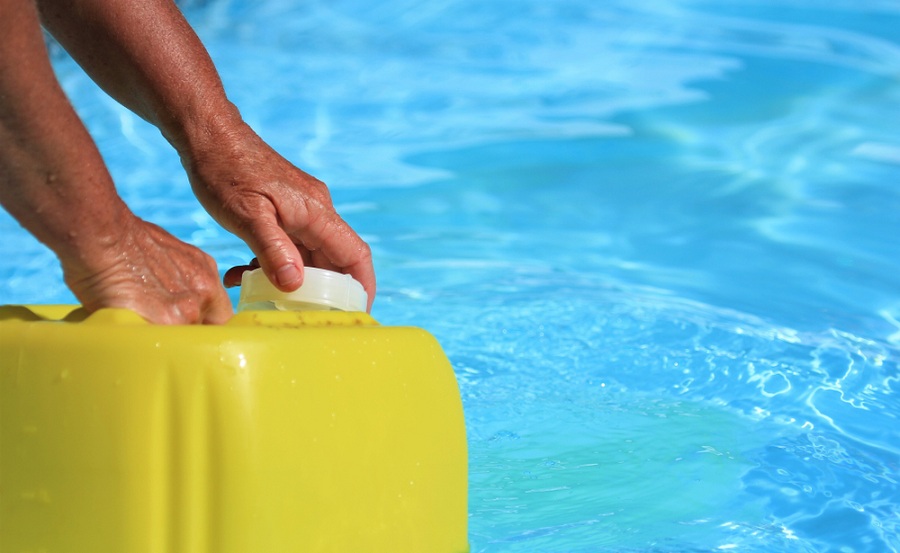
You might think adding chemicals to your pool would help prevent algae growth. However, many chemicals used to treat swimming pools encourage algae growth.
Algae thrive when there is too much light, so these chemicals encourage algae growth.
Some of them can also harm fish and other aquatic life.
Tips to Keep Your Swimming Pool Clean
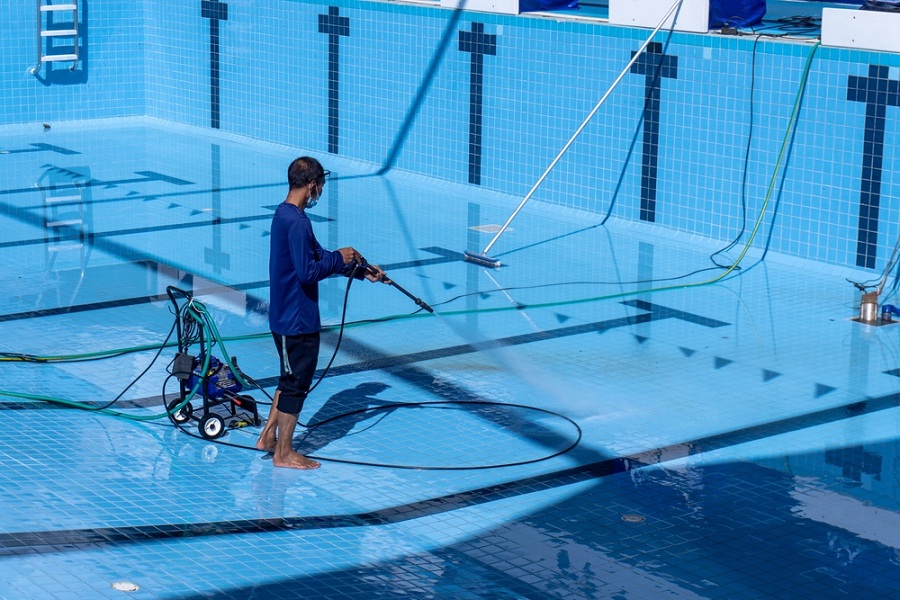
You may not need to do all these steps if you have a small backyard pool. However, you will want to take extra precautions if your pool is large.
Remember the following tips when cleaning your swimming pool after a flood or storm.
Clean the pool daily
Cleaning your pool once a week is usually enough. But if you notice mold growing around the pool’s edges, or if you see sediment at the bottom of the pool, you should clean it more often.
Make sure the pool’s filtration system is working properly
The most important part of keeping your pool clean is ensuring its filtration system works properly. If this component fails, you could end up with cloudy water, making it difficult for swimmers to enjoy their time in the pool.
Change the filters regularly.
Regularly changing the filters helps keep your pool clean and healthy. You should change them every three months.
Avoid leaving children unattended near the pool.
Children who play near pools without adult supervision are at risk of drowning.
Protect yourself against sunburn
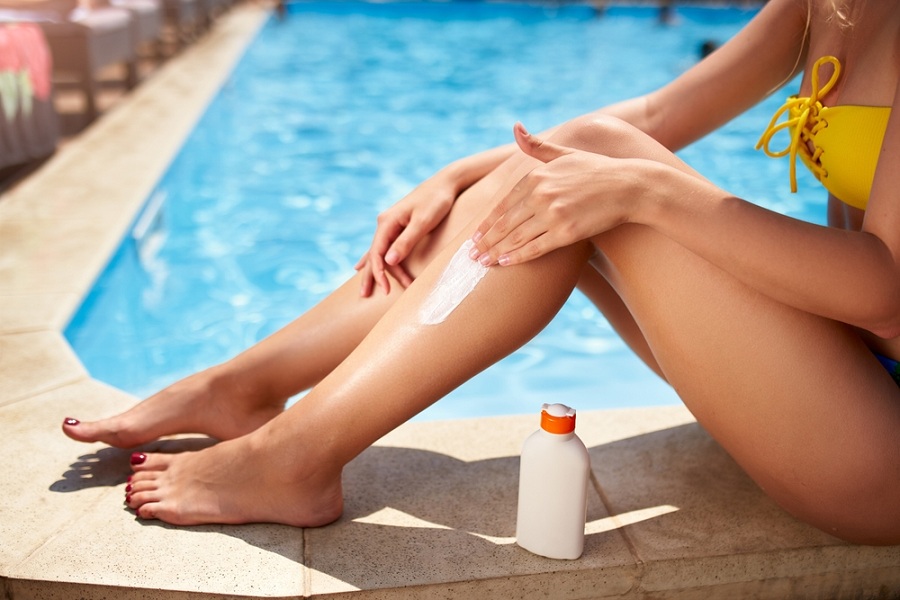
Sunscreen lotions help protect your skin from the harmful effects of ultraviolet (UV) rays. Apply sunscreen 30 minutes before going into the pool.
Maintain a safe temperature
Keeping the water cool is an easy way to prevent scalding injuries. This also prevents bacteria growth.
Keep the pool covered during winter.
Covering the pool keeps it cooler than open-air pools. It also protects the pool from rain damage.
Use a cover over the pool.
A cover can protect your pool from debris such as leaves and twigs. It also helps keep the pool cleaner by preventing insects from building nests inside the pool.
Have fun!
Swim safely and enjoy your pool.
FAQs
Q: How long should I wait between cleaning my pool?
A: The National Swimming Pool Foundation recommends waiting at least 48 hours before entering the pool.
Q: What happens if I don’t clean my pool right away?
A: If you let the water sit in your pool for longer than 48 hours, you could have a nasty bacterial infection.
Q: Can I use chlorine to disinfect my pool?
A: Yes, but only in small amounts. Chlorine kills off bacteria and viruses, but it doesn’t kill algae.
Q: Why does my pool smell bad after a flood?
A: Debris and dirty water collect on the bottom of your pool. This material decomposes over time, releasing unpleasant odors.
Q: My pool has been flooded twice this year. Is it safe to go back in?
A: No! Your pool is not safe until it has been cleaned thoroughly. You could get sick or die if you enter a contaminated pool.
Q: Will my pool be okay if I just remove all the furniture and cover it with plastic?
A: It’s possible that the furniture could still leak into the pool. Even though the furniture is covered, it could be a breeding ground for mold.
Q: Should I drain my pool before cleaning it?
A: Yes. Drain your pool entirely before cleaning. Otherwise, you run the risk of getting sick from contaminated water.
Q: Do I need to drain my pool before cleaning?
A: Yes, unless you want to save money. Some people say that draining your pool makes it easier to clean. But others say it takes less time to do the job without draining first.
Q: Does anyone know how to clean a pool properly?
A: Of course we do. We’ve written a step-by-step guide to help you clean your pool.
Q: How often should I clean my pool?
A; Most experts recommend cleaning your pool every three weeks.
Q: How do I keep my pool clean?
A: Keep your pool clean by using a good filter system. Also, make sure that you have proper lighting.
Q: How can I tell if my pool needs to be drained?
A: When your pool starts to look cloudy, debris is collecting on the bottom of your tank. Make sure that you drain your pool before cleaning it.
Q: How can I get rid of algae?
A: Algae are microscopic plants that grow naturally in some parts of the world. They love warm temperatures and lots of sunlight.

